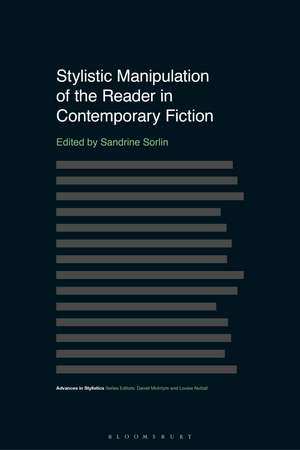Stylistic Manipulation of the Reader in Contemporary Fiction: Advances in Stylistics
Editat de Dr Sandrine Sorlinen Limba Engleză Hardback – 11 dec 2019
| Toate formatele și edițiile | Preț | Express |
|---|---|---|
| Paperback (1) | 218.18 lei 43-57 zile | |
| Bloomsbury Publishing – 16 iun 2021 | 218.18 lei 43-57 zile | |
| Hardback (1) | 774.20 lei 43-57 zile | |
| Bloomsbury Publishing – 11 dec 2019 | 774.20 lei 43-57 zile |
Din seria Advances in Stylistics
- 14%
 Preț: 569.53 lei
Preț: 569.53 lei - 18%
 Preț: 180.88 lei
Preț: 180.88 lei - 13%
 Preț: 239.14 lei
Preț: 239.14 lei -
 Preț: 257.03 lei
Preț: 257.03 lei - 13%
 Preț: 257.12 lei
Preț: 257.12 lei -
 Preț: 237.20 lei
Preț: 237.20 lei - 11%
 Preț: 217.82 lei
Preț: 217.82 lei - 13%
 Preț: 239.21 lei
Preț: 239.21 lei -
 Preț: 257.68 lei
Preț: 257.68 lei -
 Preț: 257.97 lei
Preț: 257.97 lei - 13%
 Preț: 257.68 lei
Preț: 257.68 lei - 13%
 Preț: 256.59 lei
Preț: 256.59 lei -
 Preț: 254.75 lei
Preț: 254.75 lei -
 Preț: 224.11 lei
Preț: 224.11 lei - 13%
 Preț: 257.97 lei
Preț: 257.97 lei - 13%
 Preț: 256.85 lei
Preț: 256.85 lei - 23%
 Preț: 200.71 lei
Preț: 200.71 lei - 22%
 Preț: 223.67 lei
Preț: 223.67 lei - 23%
 Preț: 229.86 lei
Preț: 229.86 lei - 21%
 Preț: 218.18 lei
Preț: 218.18 lei - 23%
 Preț: 199.45 lei
Preț: 199.45 lei -
 Preț: 198.12 lei
Preț: 198.12 lei - 23%
 Preț: 192.19 lei
Preț: 192.19 lei -
 Preț: 254.84 lei
Preț: 254.84 lei
Preț: 774.20 lei
Preț vechi: 990.70 lei
-22% Nou
Puncte Express: 1161
Preț estimativ în valută:
148.19€ • 161.02$ • 124.56£
148.19€ • 161.02$ • 124.56£
Carte tipărită la comandă
Livrare economică 21 aprilie-05 mai
Preluare comenzi: 021 569.72.76
Specificații
ISBN-13: 9781350062962
ISBN-10: 1350062960
Pagini: 264
Dimensiuni: 156 x 234 mm
Greutate: 0.54 kg
Editura: Bloomsbury Publishing
Colecția Bloomsbury Academic
Seria Advances in Stylistics
Locul publicării:London, United Kingdom
ISBN-10: 1350062960
Pagini: 264
Dimensiuni: 156 x 234 mm
Greutate: 0.54 kg
Editura: Bloomsbury Publishing
Colecția Bloomsbury Academic
Seria Advances in Stylistics
Locul publicării:London, United Kingdom
Caracteristici
Describes how texts play with their cognitive processes by offering detailed descriptions of linguistic features serving as cues to elicit the emotions and thoughts that may arise when reading
Notă biografică
Sandrine Sorlin is Professor of English Language and Linguistics at University Paul Valéry of Montpellier 3, France.
Cuprins
1. Introduction: Manipulation in Fiction, Sandrine Sorlin (University Paul Valéry Montpellier 3, France) Part I. Manipulating Positions, Representations and Viewpoints 2. Metalepsis, Counterfactuality and the Forked Path in The French Lieutenant's Woman, Marina Lambrou (Kingston University, UK)3. Social Deixis in Literature, Andrea Macrae (Oxford Brookes University, UK)4. 'The Novel of the Future': Author's Manipulation in Henry Green's Nothing (1950) and Doting (1952), Rocío Montoro (University of Granada, Spain)5. Building a World from the Day's Remains: Showing, Telling, Re-presenting, Jeremy Scott (University of Kent, UK) Part II. Readers' Responses to Stylistic Manipulation6. Manipulating Inferences: Interpretative Problems and their Effects on Readers, Billy Clark (Northumbria University, UK)7. Readers' Textual Processing and Emotional Responses to a Story Ending: An Experimental Study of a Short Story by J.D. Salinger, Laura Hidalgo Downing (Universidad Autónoma de Madrid, Spain)8. Manipulating Metaphors: Interactions Between Readers and 'Upon Opening the Chest Freezer', Sara Whiteley (University of Sheffield, UK) III. Multimodal and Genre-Specific Manipulation9. Manipulation in Agatha Christie's Detective Stories: Rhetorical Control and Cognitive Misdirection in Creating and Solving Crime Puzzles, Catherine Emmott (University of Glasgow, UK) and Marc Alexander (University of Glasgow, UK)10. Untranslatable Clues: Reader Manipulation and the Challenge of Crime Fiction Translation, Christiana Gregoriou (University of Leeds, UK)11. Multimodal Manipulation of the Reader in Abrams and Dorst's S., Nina Nørgaard (University of Southern Denmark, Denmark)Index
Recenzii
An innovative and insightful volume about manipulation in literary texts.
This is a wide-ranging and fascinating collection of essays on how texts manipulate readers - and how readers manipulate texts - as well as a real demonstration of the breadth and depth of contemporary stylistic inquiry.
This is a wide-ranging and fascinating collection of essays on how texts manipulate readers - and how readers manipulate texts - as well as a real demonstration of the breadth and depth of contemporary stylistic inquiry.
